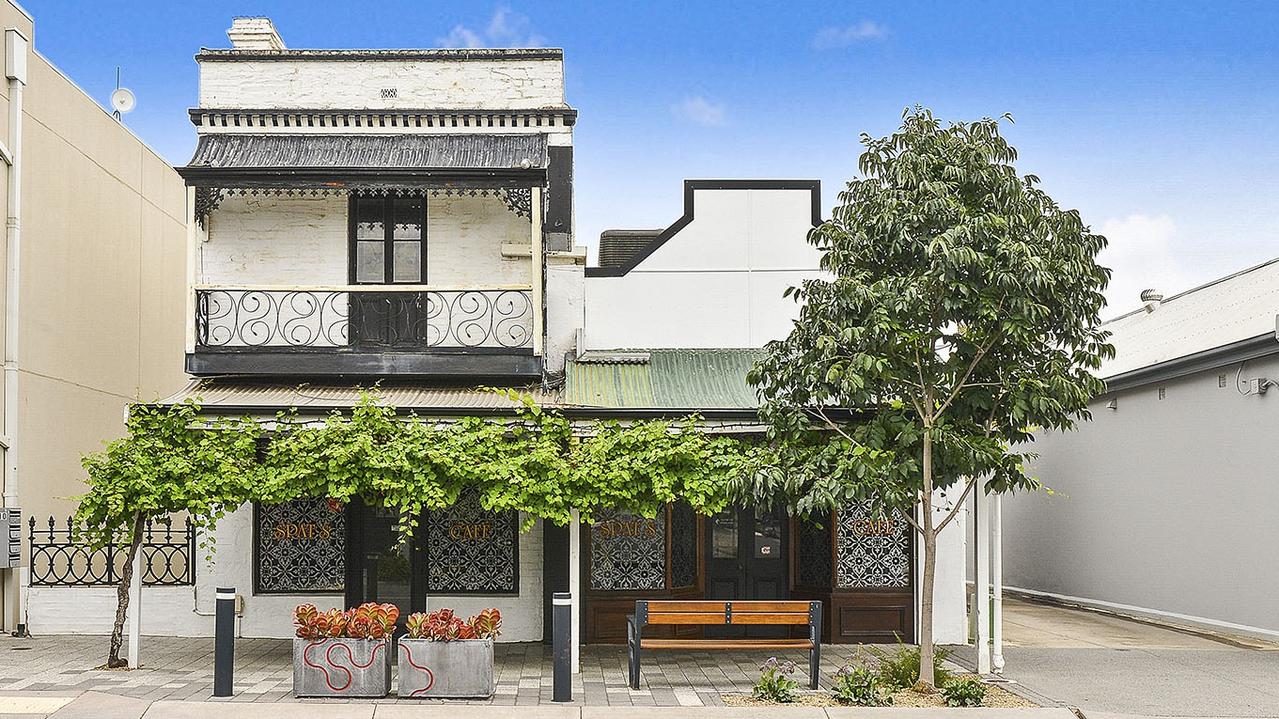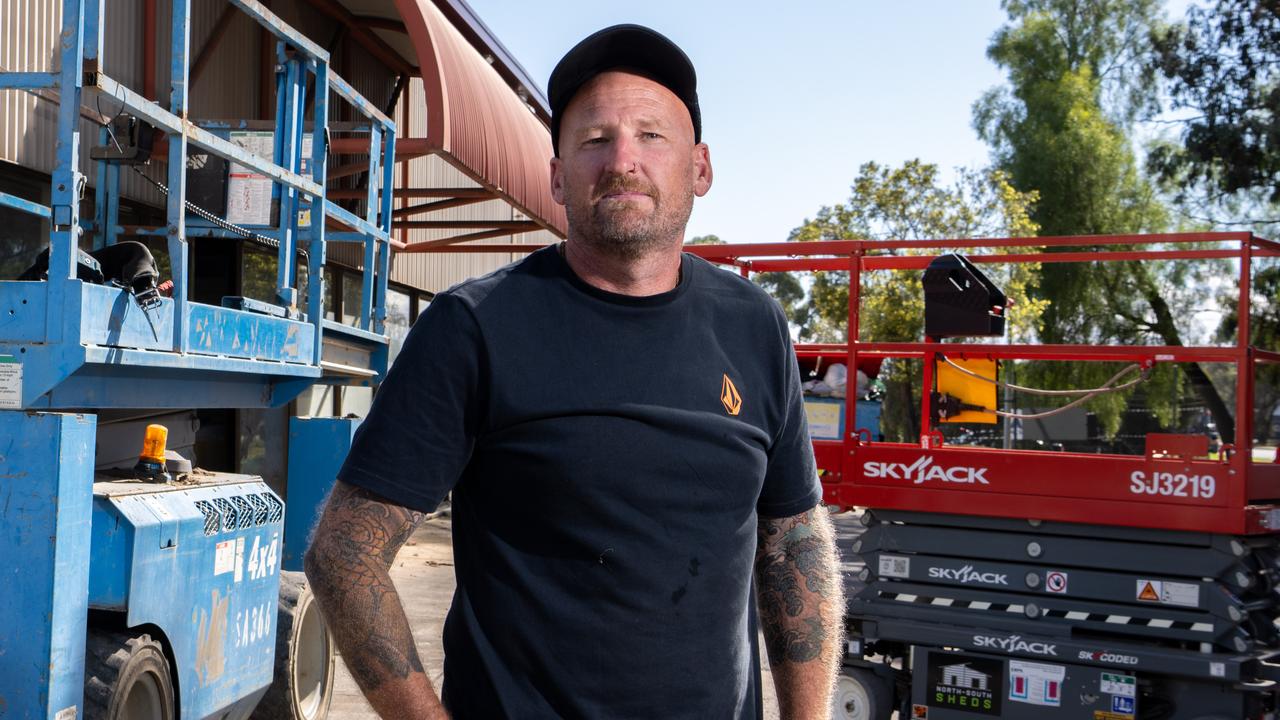Business failures in SA soar 70 per cent amid a perfect storm of challenges
Company collapses have soared almost 70 per cent in SA so far this year, and there are fears more local businesses will soon hit the wall. See the list of high-profile collapses.
South Australian company collapses have soared almost 70 per cent so far this year amid fears more local businesses will fail to survive a perfect storm of cost increases, worker shortages and the cost of living crisis.
The construction and hospitality industries are at the centre of the storm after being hit hard by Covid, and now grappling with another wave of challenges without the stimulus support provided during the pandemic.
Some of the city’s best known cafes, restaurants and pubs, including Spats, the Port Admiral Hotel and Original Pancake Kitchen have all closed venues in recent months, while the $88 million collapse of Revolution Roofing in December was the state’s largest corporate insolvency since the demise of York Civil in 2018.
According to figures from the Australian Securities and Investments Commission, there were 88 administrations and liquidations in SA in the first three months of this year, up 69 per cent from the 52 insolvencies in the corresponding period last year.
The 281 insolvencies in the 12 months to March represent a 43 per cent increase on a year-on-year basis.

Business SA chief executive Andrew Kay said that while major events including Mad March, the AFL Gather Round and LIV Golf had injected some confidence into local businesses, many industries were still doing it tough.
“You can’t underestimate how important those events are in terms of making small business positive about what’s in front of them and they certainly have assisted the hospitality sector,” he said.
“But businesses that were hurt badly by the Covid pandemic, and didn’t get a bounce when the borders opened and things went back to normal, really have struggled to hang on.
“What we’re starting to see now is the tipping point of businesses who’ve just been hanging on coming out of Covid, that didn’t get that bounce, and now we’re starting to see the impact of that.
“I think the construction sector still has challenges ahead of it, and we’d hope they can ride through with some of the announcements we’ve seen in recent months around housing developments in the state.
“But there’ll be businesses no doubt, as we’ve seen in the eastern states, that are going to struggle to get through to that period when those projects come on stream.”
Major interstate builders including Porter Davis Homes, Lloyd Group and PBS Building are among the latest high profile casualties of the construction industry crisis, in which builders locked into fixed-price contracts have been left exposed by the soaring cost of labour and materials.
South Australia’s largest builders have so far survived the fallout from industry-wide labour and materials shortages, which have forced a string of major players on the east coast to down tools and close their doors.
However Steve Weightman, director of Metro Homes SA – one of the state’s largest home builders – said there were still plenty of challenges facing the local industry.

“The HomeBuilder grant has proven to be a poisoned chalice,” he said.
“Every government around the world stimulated its economy through grants and incentives into the construction sector during the Covid pandemic – unfortunately the stimulus came at a time when production was getting shut down or stalled within the supply chain of building materials.
“Material pressures have certainly eased from what they were a year or so ago but labour is challenging, rates are high and good trades are in demand.
“Quite frankly I am amazed it (construction insolvencies) has not happened in SA yet at the same scale as interstate – after all it’s the same basic inputs and fundamentals.”
Nationally there were 1882 corporate insolvencies in the March quarter, up 74 per cent from the 1080 insolvencies during the corresponding period last year.
Oracle Insolvency Services partner Dominic Cantone expects the rate of insolvencies in SA to ramp up in the latter half of this year and into 2024 as higher costs of doing business eat away at profits and erode cash flow.
He said the hospitality sector, small retailers and other businesses relying on discretionary spending would be hit hardest as households continue to tighten their belts.
“If households spend less on discretionary items, venues like pubs and restaurants catering for middle income earners will still likely suffer,” he said.
“Power costs in particular are also a significant challenge for small business.
“This is in addition to rising supply costs in food for restaurateurs and materials for builders.
“All this is shrinking margins and forcing business owners to increase their prices at a time when consumers’ wallets are already being squeezed.”
Mr Kay said recent interest rate rises were starting to have a serious impact, and small business owners would be hoping for the Reserve Bank to hold off on more hikes.
“Where probably 12 months ago their (business owners) concerns were more around the supply side of the equation, so logistics, freight costs, etc., now they’re talking to us more about being concerned about the demand side, so revenue, profitability and the impact of interest rate rises starting to bite and take hold,” he said.
“We’d be hoping that we’ve turned the corner now on inflation and that we’ve seen the last, if not for one, interest rate hike.
“The latest pause has been very well received by businesses and it’s not just businesses who are leveraged. It’s also businesses that rely on consumer demand who are seeing it drop away as interest rates start to bite.”
Picking up the pieces after construction company collapse
Nathan Clifford is picking up the pieces after the collapse of his building company after more than seven years of trade.
In February Mr Clifford called in liquidators to wind up his company, Mojo Outdoor Constructions, amid a severe shortage of skilled workers and a sharp rise in business costs.
It’s a common story across a number of industries, particularly in construction and hospitality, where intense competition for staff is proving an insurmountable challenge for many operators.
Mojo specialised in the sale and installation of verandas, pergolas, carports, patios and sheds, with much of its work generated through insurance claims.
However Mr Clifford said the shortage of young people taking up trades had been an emerging trend over the past few years, and the demands brought on by Covid had left many business owners exposed.

“Particularly in the shed industry, because it’s not a formal accredited trade, you find it hard to create pathways for young people to come up through the job, and it’s also ridiculously physically demanding,” he said.
“It’s been happening over the last few years and Covid put a massive nail in the head. I speak to a lot of business owners in the industry who have also had those issues and ultimately that was our demise – not getting enough bums on seats to produce the work.
“We also had some employees go on WorkCover, which left a really big hole. And again it’s just another struggle of small business. The cost to fund that kind of thing is phenomenal and quite crippling.”
While small businesses across a number of industries are grappling with inflation, higher interest rates and worker shortages, the construction industry in particular has borne the brunt of the tough conditions.
Nationally, there were 1601 insolvencies in the industry during the nine months to March – the highest rate of failure in seven years. Last year the construction industry accounted for a quarter of business insolvencies across the country.
And while the financial impact of insolvency is obvious, Mr Clifford said it was the personal toll that was often much more devastating.
While Mr Clifford has found work with another construction company that agreed to take over Mojo and its four employees, the experience of business failure still cuts deep.
“It’s been a hard pill to swallow and it’s certainly something that I’d never wish on any business or any person,” Mr Clifford said.
“The tolls of running small business on marriages, relationships, children, you name it, are hardcore and I’m living it right now – right now I’m living in a caravan.
“It’s certainly highlighted the real impact on mental health, men’s mental health, something that has not been discussed anywhere near enough, particularly with guys in the construction industry.
“This experience has brought about a passion to help those business owners, to share my experiences, to share my losses, so that they don’t make the same mistakes.”
More Coverage
Originally published as Business failures in SA soar 70 per cent amid a perfect storm of challenges




